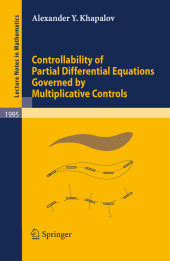 Neuerscheinungen 2010Stand: 2020-01-07 |
Schnellsuche
ISBN/Stichwort/Autor
|
Herderstra▀e 10
10625 Berlin
Tel.: 030 315 714 16
Fax 030 315 714 14
info@buchspektrum.de |

Alexander Y. Khapalov
Controllability of Partial Differential Equations Governed by Multiplicative Controls
2010. xv, 284 S. 26 SW-Abb. 235 mm
Verlag/Jahr: SPRINGER, BERLIN 2010
ISBN: 3-642-12412-7 (3642124127)
Neue ISBN: 978-3-642-12412-9 (9783642124129)
Preis und Lieferzeit: Bitte klicken
In a typical mathematical model of a controlled distributed parameter process one usually ?nds either boundary or internal locally distributed controls to serve as the means to describe the effect of external actuators on the process at hand. H- ever,these classical controls, enteringthe modelequationsas additive terms, are not suitable to deal with a vast array of processes that can change their principal intr- sic properties due to the control actions. Important examples here include (but not limitedto)thechainreaction-typeprocessesinbiomedical,nuclear,chemicalan- nancial applications, which can changetheir (reaction)rate when certain catalysts are applied, and the so-called smart materials , which can, for instance, alter their frequency response. The goal of this monograph is to address the issue of global controllability of partial differential equations in the context of multiplicative (or bilinear) c- trols, which enter the model equations as coef?cients. The mathematical models of our interest include the linear and nonlinear parabolic and hyperbolic PDE s, the Schrodi nger equation, and coupled hybrid nonlinear distributed parameter systems associated with the swimming phenomenon. Pullman, WA, USA Alexander Khapalov January 2010 vii Preface This monograph developed from the research conducted in 2001 2009 in the area of controllability theory of partial differential equations. The concept of control- bility is a principal component of Control Theory which was brought to life in the 1950 s by numerous applications in engineering, and has received the most sign- icant attention both from the engineering and the mathematical communities since then.
Multiplicative Controllability of Parabolic Equations.- Global Nonnegative Controllability of the 1-D Semilinear Parabolic Equation.- Multiplicative Controllability of the Semilinear Parabolic Equation: A Qualitative Approach.- The Case of the Reaction-Diffusion Term Satisfying Newton┤s Law.- Classical Controllability for the Semilinear Parabolic Equations with Superlinear Terms.- Multiplicative Controllability of Hyperbolic Equations.- Controllability Properties of a Vibrating String with Variable Axial Load and Damping Gain.- Controllability Properties of a Vibrating String with Variable Axial Load Only.- Reachability of Nonnegative Equilibrium States for the Semilinear Vibrating String.- The 1-D Wave and Rod Equations Governed by Controls That Are Time-Dependent Only.- Controllability for Swimming Phenomenon.- A "Basic" 2-D Swimming Model.- The Well-Posedness of a 2-D Swimming Model.- Geometric Aspects of Controllability for a Swimming Phenomenon.- Local Controllability for a Swimming Model.- Global Controllability for a "Rowing" Swimming Model.- Multiplicative Controllability Properties of the Schrodinger Equation.- Multiplicative Controllability for the Schr÷dinger Equation.
From the reviews:
"This book offers a detailed study of controllability of infinite-dimensional control systems described by partial differential equations (PDEs), for which the control input appears in a multiplicative way in the differential equations. The book has features that are not often encountered simultaneously in the rest of the literature ... . the book is interesting and will have an impact on the topic of the controllability of infinite-dimensional systems. Rigorous proofs are provided for all the results contained in the book." (Iasson Karafyllis, Mathematical Reviews, Issue 2011 h)
"In this book, the control of evolution processes governed by partial differential equations is studied. ... The book is well-written and a welcome addition to the bookshelf for mathematicians with interest in control theory and also researchers in control engineering." (Martin Gugat, Zentralblatt MATH, Vol. 1210, 2011)


